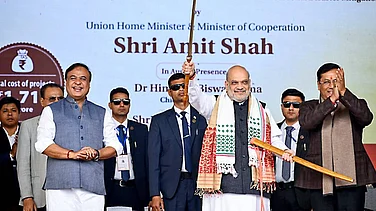The Narcotics Control Bureau (NCB), in the headlines for the Rhea Chakraborty case, is cracking down on the drug mafia. NCB Director General Rakesh Asthana, a 1984-batch Gujarat cadre IPS officer, tells Outlook that investigations into the Rhea case show that it is just the tip of the iceberg. It could lead the agency to an international network that could have links to Dubai, and even to terror groups.
The NCB does not believe that Rhea’s case is a small one, involving only 59-gramme marijuana. According to the agency, it could unravel a systematic racket of drug trafficking as questioning of suspects and investigations are leading to more links in the complicated chain. “Also, people like Rhea are role models and youngsters look up to them. They cannot be condoned. We have to make examples out of them to send a message of deterrence to others,” says Asthana.
ALSO READ: Weed Or Weedout
About questioning others in Bollywood, the agency says it is in the process of collecting evidence. “Only after that shall we will go for the big guns. I can assure you, we will be relentless. We have to get to the root of the issue. The goal is to make ‘nasha-mukt’ Bharat--a drug-free India,” the NCB chief adds.
Use of illicit drugs seems to have become a common phenomenon in the country. The agency says that it is a complicated social issue. With big bucks involved, cartels thrive on it. “Drugs are procured for rave parties and money goes to cartels and used for narco-terror. Consider the figures: the curated marijuana ‘bud’ costs Rs 8 lakh per kg. One kg of heroin costs Rs 1 crore, with 0.5 gram costing Rs 1,500, and the estimated level of consumption is one tonne per day,” the officer explains.
ALSO READ: Hi Pot, Meet Kettle
One big reason for easy availability of drugs in the country is its geographical location. Sandwiched between the Golden Crescent and the Golden Triangle, that makes India both a transit point and a destination for illicit drugs. As much as 95 per cent of world’s heroin originates in the poppy fields of Afghanistan and Myanmar.
NCB officials say that the drug market is big in India due to the sheer volume of the population. There are cartels that try to push drugs into the country, mostly using land and maritime routes. “Some of our not-so-friendly neighbours are working hand-in-hand with the big cartels. Rebel provinces of Shan and Kachin (both share borders with China too) are the hub of manufacturing heroin and ‘Yaba’ tablets. Chemical precursors used are smuggled from China and also from India. The finished product also finds its way back into India. Cocaine lands on the west coast from Canada and US via Brazil and Dubai,” says the officer. According to the agency, they have identified top 100 drug mafias operating in the country and investigations are in progress. The Kasargod network is one of them.
NCB is the nodal agency for enforcement of drug laws, and attack the supply side. It is a small agency that is supposed to coordinate with other security and enforcement agencies, both of the states and the Centre. “We have done several seizures across the country including in Delhi, Mumbai, Manipur and Mizoram through coordination with the other agencies via NCORD (Narcotics Coordination), an agency that was revamped in 2019. We eliminate illicit poppy and cannabis fields. We are working in conjunction with other agencies and countries,” DG Asthana adds.
ALSO READ


























